26 july 2018
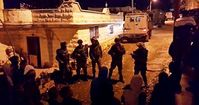
A number of Palestinians were kidnapped by the Israeli occupation forces (IOF) at predawn time Thursday and others had their money seized in an abduction sweep rocking the West Bank.
The Israeli army claimed responsibility for the abduction of nine Palestinians on allegations of involvement in anti-occupation activities.
The IOF allegedly spotted an M16 weapon and ammunition during an assault on al-Khalil province.
At the same time, sums of money were seized in Azzoun town, east of Qalqilya, over claims that they were expected to be funneled to anti-occupation groups.
Activists said three Palestinians, among them two brother, were kidnapped by the IOF from Tulkarem province. Two were kidnapped from Bethlehem.
Other Palestinians were also kidnapped from Qalqilya’s eastern town of Azzoun and al-Khalil province.
At the crack of dawn, Israeli forces demolished an agricultural storeroom in Azzoun owned by the Palestinian citizen Amir Dahbour.
Meanwhile, Israeli settlers broke into the vicinities of al-Nabi Younes in Halhul, north of al-Khalil, and Khirbet Takou’, east of Bethlehem, under the religious guise.
Clashes flared up in Beit Ummar, north of al-Khalil, shortly after the IOF rolled into the city and cracked down on the locals.
The Israeli army claimed responsibility for the abduction of nine Palestinians on allegations of involvement in anti-occupation activities.
The IOF allegedly spotted an M16 weapon and ammunition during an assault on al-Khalil province.
At the same time, sums of money were seized in Azzoun town, east of Qalqilya, over claims that they were expected to be funneled to anti-occupation groups.
Activists said three Palestinians, among them two brother, were kidnapped by the IOF from Tulkarem province. Two were kidnapped from Bethlehem.
Other Palestinians were also kidnapped from Qalqilya’s eastern town of Azzoun and al-Khalil province.
At the crack of dawn, Israeli forces demolished an agricultural storeroom in Azzoun owned by the Palestinian citizen Amir Dahbour.
Meanwhile, Israeli settlers broke into the vicinities of al-Nabi Younes in Halhul, north of al-Khalil, and Khirbet Takou’, east of Bethlehem, under the religious guise.
Clashes flared up in Beit Ummar, north of al-Khalil, shortly after the IOF rolled into the city and cracked down on the locals.
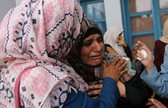
The United Nations Relief and Works Agency for Palestine Refugees in the Near East (UNRWA) will not renew the contracts of around 113 employees in the Gaza Strip, a spokesman said on Wednesday.
“UNRWA will not renew the temporary contracts for 113 Gaza-based employees in the agency’s emergency program,” Sami Mshasha told Anadolu Agency.
He said, according to Days of Palestine, that the contracts of those employees are already set to end by the end of this month.
“UNRWA will not sack them. Rather, it will not renew their contracts,” the spokesman said.
Last Monday, UNRWA employees staged an all-day sit-in inside UNRWA headquarters in Gaza City, and outside the office of UNRWA Director of Operations Matthias Shamali.
According to the UNRWA’s Staff Union, the Agency has closed its mental health programme, which was providing direct services to Palestinian refugees and employing about 430 staff.
UNRWA has also terminated the contracts of dozens of its engineers in recent months, the union officials said earlier.
The union stated that the UNRWA’s decision to sack its employees is an initial step to dismiss a thousand employees of the emergency programmes by the end of 2018, adding that next year will witness a new wave of dismissals, under the pretext of a budget deficit.
Established in 1949, UNRWA provides critical aid to Palestinian refugees displaced since 1948, and who are now living in the blockaded Gaza Strip, the Israeli-occupied West Bank, Jordan, Lebanon and Syria.
Earlier this year, the US suspended over half of the annual funding — $65 million out of $125 million — earmarked for the refugee agency.
Earlier on Wednesday, UNRWA Christopher Gunness issued the following statement, with regard to the crisis:
The complex and harsh challenges the Palestine refugee community has endured over the past decades are monumental. This year the challenges have grown, following the largest ever reduction in funding UNRWA has faced. The ability of Palestine refugees to persevere is hugely admired by many around the world who continue earnestly to express solidarity and support for them. As we continue to pursue every avenue of support to overcome a severe financial crisis, UNRWA, its dedicated staff, and the refugees have only one option – to face up to this situation together and preserve the most important work we do.
The decision of the US to cut $300 million in funding to UNRWA this year has been described by our Commissioner-General as an existential threat to UNRWA. Determined not to forsake Palestine refugees, UNRWA and its partners have mobilized political and financial support around the globe, to maintain its operations and render essential services to its beneficiaries with dignity and hope.
Our global fundraising efforts and Dignity Is Priceless campaign have led to significant additional support for UNRWA, from historical donors to new partners, including institutions for the mobilization of Zakat. Throughout this period, the Hosts provided important backing. From March to June alone UNRWA raised US$ 238 million in new funding for Palestine refugees, and with the conclusion of the New York pledging conference on 25 June, the US$ 446 deficit was reduced to US$ 217 million – a monumental achievement.
The response, so far, reaffirms that UNRWA enjoys clear support from key donors, hosts and the Secretary-General of the United Nations. Continuing and expanding this support is crucial for our efforts over the coming months to bridge the financial gap and ensure needed funding for our 2019 operations.
We are still in crisis. Let no one claim otherwise. But we are also determined to maintain core services to the millions of Palestine refugees who rely on us in Jordan, Lebanon, the occupied Palestinian territory, and Syria, and preserve what we can of our emergency assistance.
Our emergency assistance is critically under-funded in the occupied Palestinian territory, where the US contribution for emergency programming — almost $100 million per year — is no longer available and has forced us to take mitigating measures.
In implementing these changes to its emergency interventions in both the West Bank and Gaza Strip, UNRWA’s humanitarian responsibility dictates that we give priority to refugees with the most critical needs. It dictates that we protect core services, including education, health and relief, via our staff members to the millions of Palestine refugees in need of such services. With the rolling out of these measures, a limited number of personnel (both area and international) will be affected.
In the West Bank owing to the absence of emergency funding, UNRWA will discontinue its Cash for Work activities effective 31 July 2018. However, households assessed in the last two years as abject poor, will be transitioned to theSocial Safety Net Programme (SSNP) – a core programme of the Agency, which we are determined to continue. This will ensure that the most impoverished refugees inside camps continue to receive assistance, and become eligible for other forms of support which are not available under Cash for Work. Food voucher activities will continue until the end of 2018, at which time households who have been assessed in the last two years as abject poor will also be transitioned to SSNP.
The Bedouin community’s food assistance programme will continue operating until the end of 2018, with UNRWA and its partner the World Food Programme actively working to secure funds for its continuation in 2019. The Community Mental Health Programme (CMHP) will be discontinued effective 31 August 2018. UNRWA is currently coordinating options to continue working with select communities alongside UN agencies. Finally, mobile health clinics will be discontinued effective 31 October 2018. UNRWA is identifying possible partners for continued service to select communities.
As a result of all these measures, 154 staff members hired against now depleted emergency funds will not have their contracts renewed upon reaching their expiry date. UNRWA recognizes the implications of such measures on affected staff. In recognition to the important service of these colleagues and their dedication, if they chose to apply in the future to vacant posts, they will be treated as ‘internal candidates’ allowing an exceptional greater opportunity for re-employment with the Agency.
In doing all it can to minimize the impact on refugees in Gaza UNRWA is prioritizing food security support to the most vulnerable refugees by continuing its emergency food programme to nearly I1 million refugees and retaining certain interventions such as Cash for Work. In order to do so, the community mental health programme, job creation programme and protection functions will have to be altered. The community mental health programme will continue, albeit at reduced capacity and cost. As of September 2018, mental health activities will be largely embedded within our health and education departments instead of a standalone programme.
In order to protect as many jobs as possible and retain components of certain emergency-based interventions by integrating them into core programmes, around 280 staff will be redeployed on full time basis in existing or revised functions and approximately 584 staff will be offered part time posts in existing or revised functions. The EA funding challenge in the Strip would result in having113 posts on emergency funding not renewed upon expiry of contract in August this year. As is the case with the West Bank field, if they choose to apply in the future to vacant posts, they will be treated as ‘internal candidates’ allowing an exceptional greater opportunity for re-deployment with the Agency.
It is important to emphasize that relentless efforts are underway to ensure that the new school year would start on time, catering to half a million students, and that our other essential services – such as health care for example – continue uninterrupted. It is equally important to be clear that UNRWA remains committed to provide assistance and protection to Palestine refugees, in accordance with its mandate. The General Assembly has consistently extended the Agency’s mandate, most recently until 30 June 2020.
In his recent letter to UNRWA staff, the Commissioner-General said that despite all the challenges it faces, the Agency “will prevail” and it will not weaken its “defense of the rights and dignity of Palestine refugees.”
“UNRWA will not renew the temporary contracts for 113 Gaza-based employees in the agency’s emergency program,” Sami Mshasha told Anadolu Agency.
He said, according to Days of Palestine, that the contracts of those employees are already set to end by the end of this month.
“UNRWA will not sack them. Rather, it will not renew their contracts,” the spokesman said.
Last Monday, UNRWA employees staged an all-day sit-in inside UNRWA headquarters in Gaza City, and outside the office of UNRWA Director of Operations Matthias Shamali.
According to the UNRWA’s Staff Union, the Agency has closed its mental health programme, which was providing direct services to Palestinian refugees and employing about 430 staff.
UNRWA has also terminated the contracts of dozens of its engineers in recent months, the union officials said earlier.
The union stated that the UNRWA’s decision to sack its employees is an initial step to dismiss a thousand employees of the emergency programmes by the end of 2018, adding that next year will witness a new wave of dismissals, under the pretext of a budget deficit.
Established in 1949, UNRWA provides critical aid to Palestinian refugees displaced since 1948, and who are now living in the blockaded Gaza Strip, the Israeli-occupied West Bank, Jordan, Lebanon and Syria.
Earlier this year, the US suspended over half of the annual funding — $65 million out of $125 million — earmarked for the refugee agency.
Earlier on Wednesday, UNRWA Christopher Gunness issued the following statement, with regard to the crisis:
The complex and harsh challenges the Palestine refugee community has endured over the past decades are monumental. This year the challenges have grown, following the largest ever reduction in funding UNRWA has faced. The ability of Palestine refugees to persevere is hugely admired by many around the world who continue earnestly to express solidarity and support for them. As we continue to pursue every avenue of support to overcome a severe financial crisis, UNRWA, its dedicated staff, and the refugees have only one option – to face up to this situation together and preserve the most important work we do.
The decision of the US to cut $300 million in funding to UNRWA this year has been described by our Commissioner-General as an existential threat to UNRWA. Determined not to forsake Palestine refugees, UNRWA and its partners have mobilized political and financial support around the globe, to maintain its operations and render essential services to its beneficiaries with dignity and hope.
Our global fundraising efforts and Dignity Is Priceless campaign have led to significant additional support for UNRWA, from historical donors to new partners, including institutions for the mobilization of Zakat. Throughout this period, the Hosts provided important backing. From March to June alone UNRWA raised US$ 238 million in new funding for Palestine refugees, and with the conclusion of the New York pledging conference on 25 June, the US$ 446 deficit was reduced to US$ 217 million – a monumental achievement.
The response, so far, reaffirms that UNRWA enjoys clear support from key donors, hosts and the Secretary-General of the United Nations. Continuing and expanding this support is crucial for our efforts over the coming months to bridge the financial gap and ensure needed funding for our 2019 operations.
We are still in crisis. Let no one claim otherwise. But we are also determined to maintain core services to the millions of Palestine refugees who rely on us in Jordan, Lebanon, the occupied Palestinian territory, and Syria, and preserve what we can of our emergency assistance.
Our emergency assistance is critically under-funded in the occupied Palestinian territory, where the US contribution for emergency programming — almost $100 million per year — is no longer available and has forced us to take mitigating measures.
In implementing these changes to its emergency interventions in both the West Bank and Gaza Strip, UNRWA’s humanitarian responsibility dictates that we give priority to refugees with the most critical needs. It dictates that we protect core services, including education, health and relief, via our staff members to the millions of Palestine refugees in need of such services. With the rolling out of these measures, a limited number of personnel (both area and international) will be affected.
In the West Bank owing to the absence of emergency funding, UNRWA will discontinue its Cash for Work activities effective 31 July 2018. However, households assessed in the last two years as abject poor, will be transitioned to theSocial Safety Net Programme (SSNP) – a core programme of the Agency, which we are determined to continue. This will ensure that the most impoverished refugees inside camps continue to receive assistance, and become eligible for other forms of support which are not available under Cash for Work. Food voucher activities will continue until the end of 2018, at which time households who have been assessed in the last two years as abject poor will also be transitioned to SSNP.
The Bedouin community’s food assistance programme will continue operating until the end of 2018, with UNRWA and its partner the World Food Programme actively working to secure funds for its continuation in 2019. The Community Mental Health Programme (CMHP) will be discontinued effective 31 August 2018. UNRWA is currently coordinating options to continue working with select communities alongside UN agencies. Finally, mobile health clinics will be discontinued effective 31 October 2018. UNRWA is identifying possible partners for continued service to select communities.
As a result of all these measures, 154 staff members hired against now depleted emergency funds will not have their contracts renewed upon reaching their expiry date. UNRWA recognizes the implications of such measures on affected staff. In recognition to the important service of these colleagues and their dedication, if they chose to apply in the future to vacant posts, they will be treated as ‘internal candidates’ allowing an exceptional greater opportunity for re-employment with the Agency.
In doing all it can to minimize the impact on refugees in Gaza UNRWA is prioritizing food security support to the most vulnerable refugees by continuing its emergency food programme to nearly I1 million refugees and retaining certain interventions such as Cash for Work. In order to do so, the community mental health programme, job creation programme and protection functions will have to be altered. The community mental health programme will continue, albeit at reduced capacity and cost. As of September 2018, mental health activities will be largely embedded within our health and education departments instead of a standalone programme.
In order to protect as many jobs as possible and retain components of certain emergency-based interventions by integrating them into core programmes, around 280 staff will be redeployed on full time basis in existing or revised functions and approximately 584 staff will be offered part time posts in existing or revised functions. The EA funding challenge in the Strip would result in having113 posts on emergency funding not renewed upon expiry of contract in August this year. As is the case with the West Bank field, if they choose to apply in the future to vacant posts, they will be treated as ‘internal candidates’ allowing an exceptional greater opportunity for re-deployment with the Agency.
It is important to emphasize that relentless efforts are underway to ensure that the new school year would start on time, catering to half a million students, and that our other essential services – such as health care for example – continue uninterrupted. It is equally important to be clear that UNRWA remains committed to provide assistance and protection to Palestine refugees, in accordance with its mandate. The General Assembly has consistently extended the Agency’s mandate, most recently until 30 June 2020.
In his recent letter to UNRWA staff, the Commissioner-General said that despite all the challenges it faces, the Agency “will prevail” and it will not weaken its “defense of the rights and dignity of Palestine refugees.”
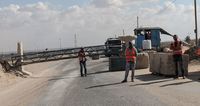
Gaza’s economy is on the threshold of a serious collapse as a result of the closure, by the Israeli occupation authorities, of the Karam Abu Salem crossing point, head of the Palestinian Businessmen Association, Ali al-Hayek, has said.
Hayek warned of the severe economic fallouts of the closure of the Abu Salem border crossing, saying over the past ten days a deficit of millions of dollars has rocked the blockaded coastal enclave.
He added that exports have been ceased, commercial deals halted, and goods expired as a result of Israel’s penal measures on Gaza.
“Israeli authorities blocked the exit of nearly 800 trucks laden with goods out of the enclave after the closure decision was put into effect”, Hayek continued. “Dozens of trucks have been denied access out of and into the Gaza Strip since July 5.”
“The balance of trade has been destabilized and civilians’ purchasing power has remarkably gone downhill”, Hayek further warned. “Prices of vegetables have started to seriously shrink back.”
On Monday, July 9, the Israeli occupation government ruled for shutting the Karam Abu Salem crossing, Gaza’s sole commercial passageway, blocking the importation and exportation of vital goods.
A blockade enforced by the Israeli occupation on the enclave for 12 consecutive years has added bad to worse, turning Gaza into the world’s largest open-air prison.
Hayek warned of the severe economic fallouts of the closure of the Abu Salem border crossing, saying over the past ten days a deficit of millions of dollars has rocked the blockaded coastal enclave.
He added that exports have been ceased, commercial deals halted, and goods expired as a result of Israel’s penal measures on Gaza.
“Israeli authorities blocked the exit of nearly 800 trucks laden with goods out of the enclave after the closure decision was put into effect”, Hayek continued. “Dozens of trucks have been denied access out of and into the Gaza Strip since July 5.”
“The balance of trade has been destabilized and civilians’ purchasing power has remarkably gone downhill”, Hayek further warned. “Prices of vegetables have started to seriously shrink back.”
On Monday, July 9, the Israeli occupation government ruled for shutting the Karam Abu Salem crossing, Gaza’s sole commercial passageway, blocking the importation and exportation of vital goods.
A blockade enforced by the Israeli occupation on the enclave for 12 consecutive years has added bad to worse, turning Gaza into the world’s largest open-air prison.
25 july 2018
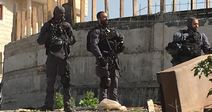
The Israeli Occupation Forces (IOF) on Tuesday evening levelled Palestinian lands in Ras al-Ahmar village, southeast of Tubas, for the construction of a new road to serve Israeli settlers.
Four Israeli bulldozers destroyed a water pipeline that was supplying the village with fresh water as they razed the land to open the road, according to the local activist Motaz Bisharat.
The IOF declared the area a closed military zone and prevented its Palestinian residents from leaving their tents during the operation.
Ras al-Ahmar is often subjected to numerous Israeli violations including demolition, razing of land and military training.
Israeli Forces Demolish Water Pipeline in Jordan Valley Village
Israeli bulldozers destroyed a water pipeline supplying the northern Jordan Valley village of Ras al-Ahmar with fresh drinking water, before dawn on Wednesday.
According to a local official, Mutaz Bisharat, four Israeli bulldozers raided the Ras al-Ahmar village, along with seven Israeli military jeeps, and began to destroy the pipeline.
Bisharat added, according to Ma’an, that Israeli bulldozers razed the land for five hours, in order to create a military road.
He pointed out that the destroyed pipeline was used by local Palestinian farmers, for drinking water and crop irrigation.
Israeli forces destroyed a water pipeline of 1,500 meters and 6 inches in length, and created a 2.5 kilometer-long road linking the main road of Ras al-Ahmar village to the Msheibek area, which Israel declared a closed military zone.
Locals reported that, while Israeli forces razed the land, Palestinian residents were prevented from entering or exiting the area.
Khirbet Ras al-Ahmar is one of approximately 180 Palestinian villages, in the occupied West Bank, located on lands designated as ‘Area C’ — the area of the West bank under full Israeli security and civilian control — according to Israeli human rights NGO B’Tselem.
The village is often raided by Israeli forces, who perform various military operations in the area, forcing residents of the village to leave their homes for several hours or even days.
Additionally, the village is a designated Israeli military “firing zone.”
Nearly 20 percent of the occupied West Bank has been declared “firing zones” since the 1970s, but, according to the UN, nearly 80 percent of these areas are not in fact used for military training.
Rights groups have accused Israel of declaring some parts of the West Bank as firing zones as an attempt to annex these areas.
Four Israeli bulldozers destroyed a water pipeline that was supplying the village with fresh water as they razed the land to open the road, according to the local activist Motaz Bisharat.
The IOF declared the area a closed military zone and prevented its Palestinian residents from leaving their tents during the operation.
Ras al-Ahmar is often subjected to numerous Israeli violations including demolition, razing of land and military training.
Israeli Forces Demolish Water Pipeline in Jordan Valley Village
Israeli bulldozers destroyed a water pipeline supplying the northern Jordan Valley village of Ras al-Ahmar with fresh drinking water, before dawn on Wednesday.
According to a local official, Mutaz Bisharat, four Israeli bulldozers raided the Ras al-Ahmar village, along with seven Israeli military jeeps, and began to destroy the pipeline.
Bisharat added, according to Ma’an, that Israeli bulldozers razed the land for five hours, in order to create a military road.
He pointed out that the destroyed pipeline was used by local Palestinian farmers, for drinking water and crop irrigation.
Israeli forces destroyed a water pipeline of 1,500 meters and 6 inches in length, and created a 2.5 kilometer-long road linking the main road of Ras al-Ahmar village to the Msheibek area, which Israel declared a closed military zone.
Locals reported that, while Israeli forces razed the land, Palestinian residents were prevented from entering or exiting the area.
Khirbet Ras al-Ahmar is one of approximately 180 Palestinian villages, in the occupied West Bank, located on lands designated as ‘Area C’ — the area of the West bank under full Israeli security and civilian control — according to Israeli human rights NGO B’Tselem.
The village is often raided by Israeli forces, who perform various military operations in the area, forcing residents of the village to leave their homes for several hours or even days.
Additionally, the village is a designated Israeli military “firing zone.”
Nearly 20 percent of the occupied West Bank has been declared “firing zones” since the 1970s, but, according to the UN, nearly 80 percent of these areas are not in fact used for military training.
Rights groups have accused Israel of declaring some parts of the West Bank as firing zones as an attempt to annex these areas.
22 july 2018
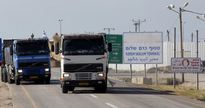
The Israeli military will recommend that the government take measures to make life easier for Gazans and give a chance to understandings reached between Egypt and Hamas over the weekend, Haaretz has reported.
Late Sunday, Israel is expected to announce the easing of the flow of goods through the Karem Abu Salem crossing and the extension of the fishing zone off the Gaza Strip that was curbed following recent events.
Broad discussions are slated to be held at the UN Security Council this week to assess the situation in the blockaded Gaza Strip.
The Israeli military claimed the current round of aggressions has just been brought to a close in anticipation of possible developments.
Late Sunday, Israel is expected to announce the easing of the flow of goods through the Karem Abu Salem crossing and the extension of the fishing zone off the Gaza Strip that was curbed following recent events.
Broad discussions are slated to be held at the UN Security Council this week to assess the situation in the blockaded Gaza Strip.
The Israeli military claimed the current round of aggressions has just been brought to a close in anticipation of possible developments.

A United Nations official has warned that Gaza’s much needed emergency supplies are running out, blocking vital services in the enclave and leaving civilians’ life at stake.
At least one hospital has been forced to shut down for a few hours, and services are being dramatically reduced at others,” said Jamie McGoldrick, the UN Humanitarian Coordinator for the Occupied Palestinian Territory.
“Given ongoing blackouts of about 20 hours a day, if fuel does not come in immediately, people’s lives will be at stake, with the most vulnerable patients, like cardiac patients, those on dialysis, and newborns in intensive care, at highest risk”, he added.
Mr. McGoldrick called on Israel to end restrictions preventing the import of fuel and for donors to provide immediate funding for emergency fuel, currently set to run out in early in August.
“Until more sustainable solutions for the electricity crisis in Gaza are found, two steps can avert further devastation in Gaza in the short term,” said Mr. McGoldrick. “Israel must let fuel and other essential supplies in and donors must mobilize resources to ensure that critical facilities receive the fuel they need.”
The humanitarian situation in Gaza has been negatively impacted by a tough blockade imposed by the Israeli occupation.
Since last Monday, the Israeli authorities have prohibited the entry of fuel into Gaza as part of tightened import and export restrictions, reportedly in response to the launch of incendiary kites from Gaza into Israel, which has caused extensive property damage.
According to the World Health Organization (WHO), al-Quds Hospital, which provides life-saving medical interventions for 150,000 people per year, including major surgeries, deliveries and intensive care will be forced to shut down in coming days due to lack of fuel.
Other hospitals are likely to run out of fuel within the next few days, thus significantly reducing the provision of essential medical services to the population in Gaza.
The Palestinian Ministry of Health already has implemented strict contingency measures: hospitals have reduced diagnostic, sterilization and cleaning services, increasing the risk of infections amongst patients.
At least one hospital has been forced to shut down for a few hours, and services are being dramatically reduced at others,” said Jamie McGoldrick, the UN Humanitarian Coordinator for the Occupied Palestinian Territory.
“Given ongoing blackouts of about 20 hours a day, if fuel does not come in immediately, people’s lives will be at stake, with the most vulnerable patients, like cardiac patients, those on dialysis, and newborns in intensive care, at highest risk”, he added.
Mr. McGoldrick called on Israel to end restrictions preventing the import of fuel and for donors to provide immediate funding for emergency fuel, currently set to run out in early in August.
“Until more sustainable solutions for the electricity crisis in Gaza are found, two steps can avert further devastation in Gaza in the short term,” said Mr. McGoldrick. “Israel must let fuel and other essential supplies in and donors must mobilize resources to ensure that critical facilities receive the fuel they need.”
The humanitarian situation in Gaza has been negatively impacted by a tough blockade imposed by the Israeli occupation.
Since last Monday, the Israeli authorities have prohibited the entry of fuel into Gaza as part of tightened import and export restrictions, reportedly in response to the launch of incendiary kites from Gaza into Israel, which has caused extensive property damage.
According to the World Health Organization (WHO), al-Quds Hospital, which provides life-saving medical interventions for 150,000 people per year, including major surgeries, deliveries and intensive care will be forced to shut down in coming days due to lack of fuel.
Other hospitals are likely to run out of fuel within the next few days, thus significantly reducing the provision of essential medical services to the population in Gaza.
The Palestinian Ministry of Health already has implemented strict contingency measures: hospitals have reduced diagnostic, sterilization and cleaning services, increasing the risk of infections amongst patients.
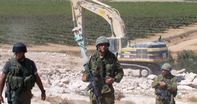
Israeli bulldozers on Sunday uprooted dozens of Palestinian-owned olive and almond trees in Bab al-Marj area of Deir Ballut town, west of Salfit.
Eyewitnesses said that the bulldozers leveled vast tracts of privately-owned lands in the area under the pretext that they are "state property".
Mayor of Deir Ballut Kamal Mousa said that the bulldozing operation, launched by Israel's so-called Civil Administration in Bab al-Marj and Iraq al-Tota areas in Deir Ballut, serves a project to expand Leshem settlement illegally built on Palestinian lands.
For his part, anti-settlement researcher Khaled Ma'ali said that the Israeli occupation authorities claim that the land confiscation notices handed to the residents of Deir Ballut are based on military orders and that the buildings established by Palestinian citizens on the targeted lands are unlicensed.
Ma'ali affirmed that these orders are part of a larger plan to expand Israeli settlements in the West Bank.
The Palestinian researcher stressed that Israel violates international humanitarian law and Fourth Geneva Convention especially Articles 59 and 49 which prohibit land confiscation and transfer of Israeli civilians to occupied territories.
He noted that the Rome Statute of the International Criminal Court of 1998 considers any act that causes widespread, long-term and severe damage to the natural environment and violates the principle of proportionality a war crime.
Eyewitnesses said that the bulldozers leveled vast tracts of privately-owned lands in the area under the pretext that they are "state property".
Mayor of Deir Ballut Kamal Mousa said that the bulldozing operation, launched by Israel's so-called Civil Administration in Bab al-Marj and Iraq al-Tota areas in Deir Ballut, serves a project to expand Leshem settlement illegally built on Palestinian lands.
For his part, anti-settlement researcher Khaled Ma'ali said that the Israeli occupation authorities claim that the land confiscation notices handed to the residents of Deir Ballut are based on military orders and that the buildings established by Palestinian citizens on the targeted lands are unlicensed.
Ma'ali affirmed that these orders are part of a larger plan to expand Israeli settlements in the West Bank.
The Palestinian researcher stressed that Israel violates international humanitarian law and Fourth Geneva Convention especially Articles 59 and 49 which prohibit land confiscation and transfer of Israeli civilians to occupied territories.
He noted that the Rome Statute of the International Criminal Court of 1998 considers any act that causes widespread, long-term and severe damage to the natural environment and violates the principle of proportionality a war crime.
21 july 2018
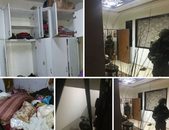
The head of the Hebron office of the Palestinian Prisoners’ Society (PPS) Amjad Najjar, stated that Israeli soldiers resort to the excessive use of force during their nightly invasions into Palestinian homes, and deliberately cause damage to furniture and property during the violent searches their conduct.
In a statement released Saturday, Najjar said that the PPS documented more than 300 abductions of Palestinians from their homes, in the past few months, in which the soldiers caused excessive damage to the homes, including destroying furniture, breaking and removing floor tiles, slashing furniture, tearing apart books, destroying bedrooms and closets, in addition to stealing money under vague pretexts.
Najjar also said that the soldiers illegally confiscated eleven Palestinian cars owned by the abducted persons, or by former political prisoners.
He stated that dozens of Palestinians provided sworn testimonies to the Palestinian Prisoners’ Society in which they revealed the extent of damage caused to their homes, stating that the soldiers also wired and detonated their main doors of their homes before storming them.
The families also said that the soldiers even destroyed photo albums, damaged or confiscated computers, laptops and mobile phones without any legal cause or justification.
Najjar stated that, in many cases, the soldiers forced the families in one room while searching their homes, and by the time they are allowed out, they realize the extent of damage caused to their property.
He said that the soldiers sometimes raid the fridges of the families, use their microwave ovens and eat their food, “just like mercenaries would do, they would cause the utmost level of destruction before they leave.”
“What Israel’s army is doing is piracy and theft,” Najjar stated, “They terrify the families, the women and children, and cause extensive and serious destruction.”
Najjar urged the International Red Cross and various legal and human rights organizations to intervene and put an end to what he called “the escalating organized crimes, committed by the Israeli army Mafia against the Palestinian civilians,” and stated that such violations must be prosecuted.
He also said that the families already face dire economic conditions, and these violent Israeli military invasions and searches cause them heavy financial burdens, and called for forming a special committee to compensate them for their losses.
In a statement released Saturday, Najjar said that the PPS documented more than 300 abductions of Palestinians from their homes, in the past few months, in which the soldiers caused excessive damage to the homes, including destroying furniture, breaking and removing floor tiles, slashing furniture, tearing apart books, destroying bedrooms and closets, in addition to stealing money under vague pretexts.
Najjar also said that the soldiers illegally confiscated eleven Palestinian cars owned by the abducted persons, or by former political prisoners.
He stated that dozens of Palestinians provided sworn testimonies to the Palestinian Prisoners’ Society in which they revealed the extent of damage caused to their homes, stating that the soldiers also wired and detonated their main doors of their homes before storming them.
The families also said that the soldiers even destroyed photo albums, damaged or confiscated computers, laptops and mobile phones without any legal cause or justification.
Najjar stated that, in many cases, the soldiers forced the families in one room while searching their homes, and by the time they are allowed out, they realize the extent of damage caused to their property.
He said that the soldiers sometimes raid the fridges of the families, use their microwave ovens and eat their food, “just like mercenaries would do, they would cause the utmost level of destruction before they leave.”
“What Israel’s army is doing is piracy and theft,” Najjar stated, “They terrify the families, the women and children, and cause extensive and serious destruction.”
Najjar urged the International Red Cross and various legal and human rights organizations to intervene and put an end to what he called “the escalating organized crimes, committed by the Israeli army Mafia against the Palestinian civilians,” and stated that such violations must be prosecuted.
He also said that the families already face dire economic conditions, and these violent Israeli military invasions and searches cause them heavy financial burdens, and called for forming a special committee to compensate them for their losses.
20 july 2018
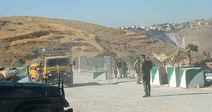
The Israeli occupation forces closed on Friday morning the Container checkpoint, set up northeast of Bethlehem, blocking Palestinians’ access out of and into the area.
Palestinian civilians and vehicles lined up in the streets after the occupation army closed off the Container checkpoint.
Palestinians citizen and drivers passing through the area have been subjected to intensive inspection and search.
Israeli forces arbitrarily shut down checkpoints and thoroughfares used by students, employees, and patients to travel across the West Bank.
Palestinian civilians and vehicles lined up in the streets after the occupation army closed off the Container checkpoint.
Palestinians citizen and drivers passing through the area have been subjected to intensive inspection and search.
Israeli forces arbitrarily shut down checkpoints and thoroughfares used by students, employees, and patients to travel across the West Bank.
19 july 2018

The cooking gas distribution companies announced on Thursday that the Gaza Strip has run out of cooking gas as a result of Israel’s continuing closure of Karam Abu Salem border crossing, the only commercial crossing with the Gaza Strip.
Owners of gas distribution companies said that due to Israel’s closure of the crossing, the companies have run out of cooking gas which only enters Gaza through Karam Abu Salem crossing.
Israel imposed new restrictions on Gaza on July 9, prohibiting the entry of goods, except medical and food supplies, banning the exit of all goods, and restricting the fishing area along the Gaza coast to three nautical miles.
According to the Israeli occupation authorities, the measures were adopted in response to the launching of incendiary kites and balloons from Gaza towards Israel, which have resulted in scores of fires that have burned thousands acres of land in Israeli settlements.
Owners of gas distribution companies said that due to Israel’s closure of the crossing, the companies have run out of cooking gas which only enters Gaza through Karam Abu Salem crossing.
Israel imposed new restrictions on Gaza on July 9, prohibiting the entry of goods, except medical and food supplies, banning the exit of all goods, and restricting the fishing area along the Gaza coast to three nautical miles.
According to the Israeli occupation authorities, the measures were adopted in response to the launching of incendiary kites and balloons from Gaza towards Israel, which have resulted in scores of fires that have burned thousands acres of land in Israeli settlements.

Israeli police demolished on Thursday morning two Palestinian-owned houses in Beit Hanina town, in occupied Jerusalem, under the pretext of being built without permit.
Police forces stormed the town early today accompanied with a number of bulldozers and started demolishing two houses belonging to Shawamra and Abu Armiya families.
Israel has escalated over the past few days its demolition policy where a Palestinian house was demolished in Shufat neighborhood on Tuesday, while a Jerusalemite man was forced to demolish his own house in Silwan town on Monday.
Meanwhile, Israeli forces destroyed water pipelines in Furush Beit Dajan village, east of Nablus.
Deputy Mayor of Furush Beit Dajan, Azzam al-Hajj Mohammad, said that Israeli forces escorted bulldozers as they destroyed pipelines supplying water for farmlands and residential homes under the pretext of being unauthorized.
Police forces stormed the town early today accompanied with a number of bulldozers and started demolishing two houses belonging to Shawamra and Abu Armiya families.
Israel has escalated over the past few days its demolition policy where a Palestinian house was demolished in Shufat neighborhood on Tuesday, while a Jerusalemite man was forced to demolish his own house in Silwan town on Monday.
Meanwhile, Israeli forces destroyed water pipelines in Furush Beit Dajan village, east of Nablus.
Deputy Mayor of Furush Beit Dajan, Azzam al-Hajj Mohammad, said that Israeli forces escorted bulldozers as they destroyed pipelines supplying water for farmlands and residential homes under the pretext of being unauthorized.
Page: 22 - 21 - 20 - 19 - 18 - 17 - 16 - 15 - 14 - 13 - 12 - 11 - 10 - 9 - 8 - 7 - 6 - 5 - 4 - 3 - 2
